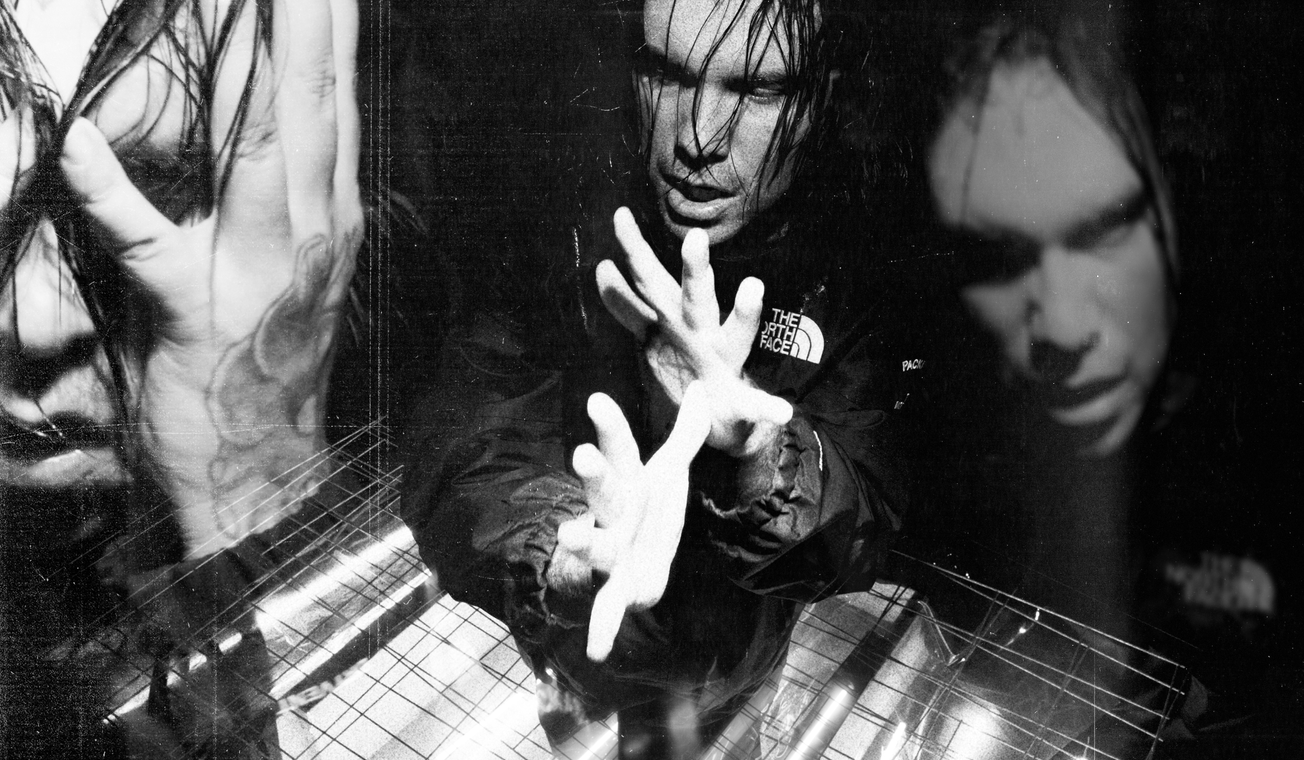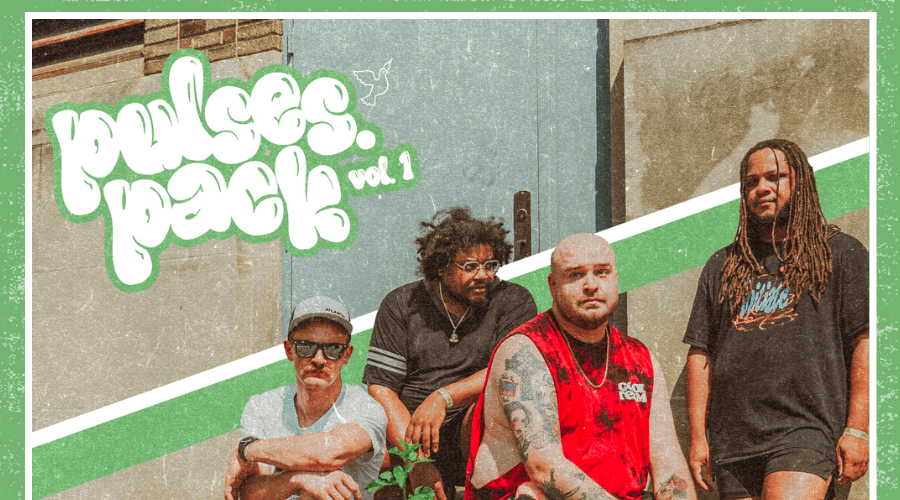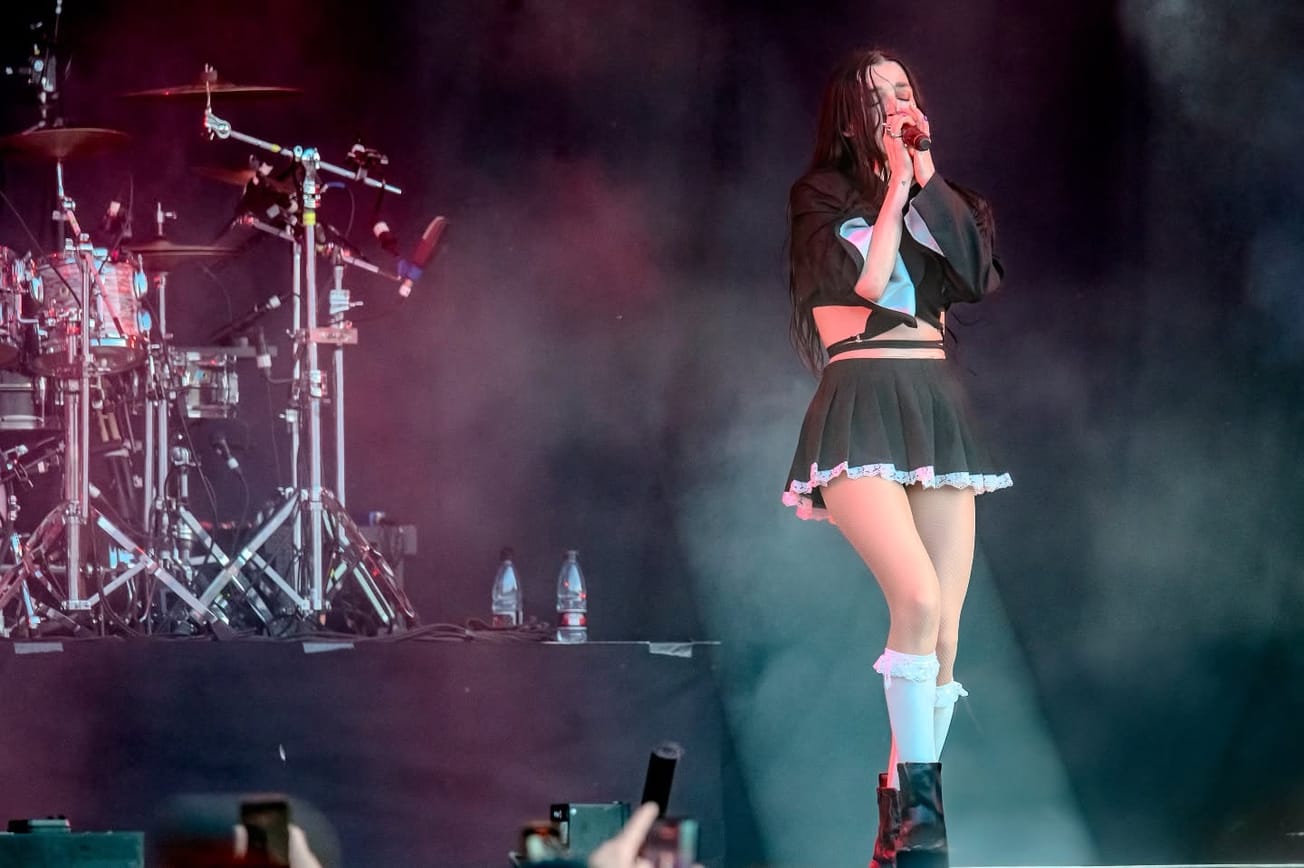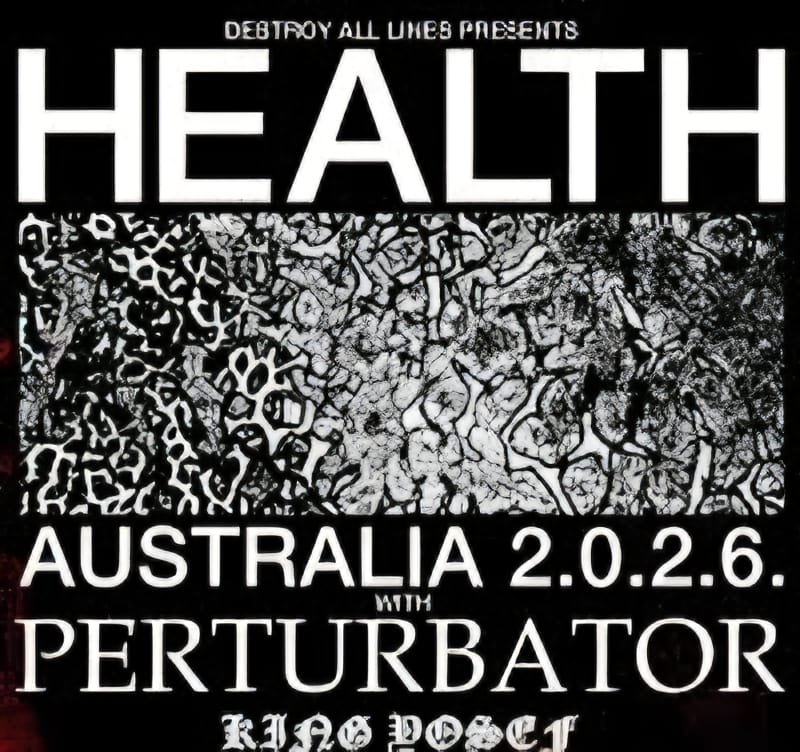Omerta is one of the most bombastic and divisive bands hitting the heavy music scene as of late. The quintet only have a single EP, Hyperviolence, but it's shockwave still undulates, even now, three years later. Don't let the discography fool you, they're prolific in eliciting dark emotions; a mix of hyperpop, beatdown hardcore and nu-metal. By channeling rich, cathartic images of violence, Omerta established themselves as some of the most interesting minds among metal musicians today. On their recent tour with Counterparts, I got the opportunity to sit down and talk with them about nu-metal, its influence, their patented edginess, and what inspires them to create like they do.
June: Who would you say were biggest three artists that influenced you guys?
Gus: For Hyperviolence... one of the biggest was early Slipknot, obviously. I mean it's undeniable. We literally ripped riffs and didn't change them. As far as the rapping goes, I'd have to say Ghostmane. But for that era though... System of a Down. For us it’s really inconvenient, we are just constantly trying to seek out new artists and new music and it's hard to say what our biggest influence is. It changes from song to song. Every song is fucking different and we just, whatever we're feeling that day, we sit down to write as to what happens.
What would you say working with Johnnascus was like?
Zorn: That was a new experience for us. We wrote that song in early 2020, right after the pandemic and I think he was one of the first artists outside of our collective we worked with. He came down for a weekend and we had another song in mind that we wanted him on, showed him the new demos while driving around, it was "Antiamorous." He's like, oh, this is the song. This is the one I want to be on. The next day he came in, he wrote his lyrics and he took a different approach to it.
Han: We met John because he used to be a part of a group called Spider Game. I'm not sure if you're familiar with them but they got rappers like Lil Darkie and MK Ultra. Some of us had already been into the weird experimental glitchy music, but there were some like me who just got introduced to it. When we heard John's music, we were all like, yo, this is the craziest thing. We were instantly fans and, "We need to work with this guy." It felt very natural.
So, big question: Where’s Suicycle?
Gus: [Laughs] It’s still in the oven, it’s still brewing. We promise, we know it's frustrating but it was delayed for good reasons. We’ll be playing another new song from it... one that we were supposed to debut at our last Houston show. But I fell off the stage and busted my head open so we weren't able to. At first it was because the art was flagged, and in the middle of trying to dispute that we were like, it's been about two years, we gave ‘em two songs, why not three? So once we got the third song written we were like, "We can't just go with three songs in two years." We've got to give ‘em more. So we went back and wrote even more and labels started hearing about Suicycle, so we delayed it again. We just kept perfecting the record, kept working on it tirelessly, we felt like we got to what the next iteration of the record should be. But I promise anyone who's going to read this or whatever, it's worth the wait. I wholeheartedly believe that.
How would you guys say you deal with some of the accusations on Twitter where people say you're perpetuating toxic masculinity or saying some things that you're not supposed to say? Does it make you angry?
Gus: It doesn't make us angry at all. It was kind of our intention to ruffle feathers because these are things that everyone thinks and everyone feels. And the album Hyperviolence, it's a lot of fantasies of revenge, which all of us have had. These are things that people feel in the moment. That's why the lyrics aren't eloquent. If you read them, they're very childish and they seem like a stream of consciousness. Whenever someone cuts you off, you're not thinking, "Oh wow, fucking, I'm going to beat this person's ass in a very eloquent way." You're thinking, you want to fuck them up, you want to kick their ass. Same thing with any other way that anyone's ever done you wrong. These are just those thoughts, and for the people who say, “Oh, this is wrong”, the same people have these thoughts cross their mind. This us showing them, hey, you’re no different from us or anyone else who had these thoughts. You're scared to acknowledge them.
I suppose, it's like, you could embrace them in a healthy way without hurting anyone?
Han: Exactly. But again, people have this notion that having these intrusive thoughts is somewhat weird, but they're really not. They're very normal and it's very common.
Zorn: There’s a stigma about talking about these sorts of things. Ours tend to stray away from speaking about violence towards others, or other typical school shooter thoughts. It’s pretty straightforward in that it's just talking about getting revenge on someone. We’re not advocating for that sort of thing, we’re trying to say that these thoughts happen. People don't want to talk about these thoughts because there's a stigma, people are going to look at 'em like they're crazy, or that they're violent and they should be avoided... it's just not helping. Are we doing what's best to help these people get through these thoughts? It's pushing 'em away, alienating them [instead of] actually helping them in the end. When we talk about these things we're not trying to advocate or say that “these are right.” Rather we're saying: we're entering the psyche of someone who's having these thoughts and exploring. All this is very intentional. So when people come at us saying that, oh, “You’re fucked up for saying these sorts of things, you're promoting violence," we already knew what we were getting into and we're just trying to discuss these things.
That's why you guys sometimes do things like with Ted Kaczynski, you made a shirt with his manifesto, or something, on it?
Zorn: It's a quote from him, yes. It’s more or less someone who was alienated from society. I think he was reintegrated, his brother tried giving him a job but he felt very alienated by his brother. Pushed away, and he eventually found solace and solitude... but then got caught up in his own little pigeonhole that he eventually committed violence against others.
Gus: It's us being proactive rather than reactive. Everyone wants to throw their hands up after everything's done and be like, "Why are they doing this and that?"
It's a very tragic tale. Any type of violence is always tragic because most people that commit awful acts do so because they were raised, or did something, wrong.
Zorn: With Ted specifically he had a message that he wanted to get across. He felt that no one was listening to him and had no other way to do it. Unfortunately he found his best way to get attention was to go out violently. He wanted to get his name out there, moreso as a message than his actual name. I think that speaks to alienation, and feeling like no one listens to you.
Gus: You need to be able to express your emotions. It's healthy. It's a very healthy thing to do.
Carlos: We just hope that we can create that same solace for other people who have these thoughts, who are a little bit further ahead to almost doing something, and we want to create a space where they can relate and then maybe not do that. Find a healthier way out and maybe help prevent further tragedies.
In hardcore and metal, people are able to find communities in places they never would've otherwise. Before hardcore I was in a circle of bad people who would talk me down. I would think bad things but, in these places, I realize I can cut people out in healthy ways. I can go through these things in ways that aren't violent.
Gus: Right, exactly. Yeah. And you meet other people too who share the same mindset as you and yeah, they carry the same mindset and experience. Absolutely.
Now for a little bit of a less heavy topic...
Gus: I felt you on that one, I feel you. It's important to talk.
You're playing with Counterparts and Boundaries, with mathcore and metalcore bands. Which community accepts you the most?
Han: We used to be a hardcore band. And we have friends in hardcore that we've met during that time, of course. So we've already kind of gotten a foot in that door. But I think now we've kind of entered this weird era in our career where we are capable to tour with anybody, whether it’s a metalcore band, a post-hardcore band, whatever it is. We do that intentionally because our music, it's so diverse in genres that we want to just be able to play with any type of artist regardless of the genre. We call it genre agnostic. But I think that we've accepted that no matter what tour we do with whatever band we're usually always the odd man out. And for a while it was a little difficult to kind of swallow that pill, but I think recently we've kind of embraced it.
Slipknot was like that as well, they were the only group that was mixing breaks, hardcore riffs with turntables and everything, they were that weird one out, but because of that...
Zorn: I mean, we're trying to find our own audience. Hardcore, metalcore, rap rock or pop, maybe math rock. We tend to find people from all of those who like us, we tend to find people in those audiences who don't like us. It’s interesting, we did our first headliner last month and we saw who our fans really are, who the people who actually like us are. I mean it's a lot of younger kids, a lot of adults as well. But I don't think there's necessarily a particular one, it's a mishmash of different audiences.
Talking about that tour, what would you say the touring with Loathe, Static Dress and UnityTX was like?
Gus: I genuinely think it's going to be one of the tours that people talk about for years. Every show was, and I hate to use this term, a fucking movie. It was insane. It was beautiful. The moment that the show started, everyone was engaged and everyone loved it. The vibe between the bands was amazing, and honestly, that was the perfect tour for those bands to be together because they were all the odd men out in their respective genres, and they came together for a tour.
Dani: The craziest thing though is us, Loathe, Static Dress and even Unity, we met over the internet in 2020. It was right when we put out Hyperviolence, and we discovered Loathe during that time a little bit before that, but that's when they put out I Let It In and It Took Everything and Static Dress were catching some hype. We all became internet friends and we always talked about needing to do a tour together, so when it finally happened it was just insane we all had been friends. A literal dream tour. Kadeem said this every night: “We’re the future of heavy music.” I still to this day believe that. I think Loathe, Static Dress, Unity, all those bands are on. They're carving a clear path for themselves to something greater.
The younger people are going to decide what's going to be possible. Especially with Loathe and Static Dress, people are shifting into that shoegaze, metalcore sound. People love that because Deftones, more than anything...
Han: That’s exactly what happened with 90’s nu-metal. It was the youth of that generation that pushed the genre forward because they wanted something new. It was a response to the old heads that came before them, and that's why it pissed everyone off and that's why people are still pissed at it.
Dani: I feel like we live in such a crucial time now with the internet, literally open YouTube, Spotify, whatever you use, and speed, just overwhelmed with how much stuff is out there.
Literally without Hate5six I would not know what hardcore was.
Han: Yes absolutely, and that’s for 90% of the community. Sonny needs his stars. I love that guy. We're so fortunate to have somebody like him because there's a lot of kids who live in cities and states where shows don't exist, scenes don't exist, but these kids, they want to go to these types of shows so bad. All they can really do is sit at home, pull up YouTube or Patreon and watch Sonny's content. And again, without him, there's not much for them to do. That's exactly why anybody that has been talking down on him needs to sit down.
What do you think of this new wave of nu-metal? Do you think it's more people taking the influence and inserting it into their music? Or is it genuinely coming back?
Dani: I think it's both. I think that there are bands who listen to bands from the nineties and they just copy them. But I feel like there are other bands who take the ethos of what nu-metal is, which is combining disparate influences from what they grew up listening to, and throwing it all into a blender, and then just making music.
Gus: I think nu-metal is more than just the riffs. Just because someone does the fucking groovy slow riffs and the baggy clothes, that's not what nu-metal is. That's what it was 20 years ago. Now what nu-metal is like what we were describing. Even like Loathe, I would consider that nu-metal because they're taking everything that they are inspired by together, making something new. That’s what it is.
Han: It's things that on a surface level shouldn't belong together. I think a lot of people fail to see that nu-metal is literally just, it sounds stupid, but I feel like Nu metal's a mindset. It's an ethos. It's a belief. It's an attitude.
Kind of like how a hardcore is a belief. People will say Koyo is a hardcore band, even though sonically they're pop punk.
Han: Hardcore is such a great example because there's so many bands there, like you said, Koyo, I would say Turnstile now, new Turnstile - on a superficial level, these bands don't sound like your typical traditional hardcore band. But they have hardcore people in these bands. I would say they're hardcore kids at heart, that's where they all root from. They all share the same ethos.
Last question, which bands do you absolutely have to tour with?
Omerta [Debating]: Meshuggah, Pierce the Veil, Polkadot Stingray…
Zorn: I think the common one among us is probably Bring me the Horizon. Paledusk is another. And Static and Unity of course. Yeah, those are all our fucking boys. We gotta do it again, run it back baby. But this time it's a stadium, whenever we get to that point, we will. Loathe is very close. They're blowing the fuck up.
Gus: Also maybe Ghostmane and City Morgue. These two are a little left field. Drain! I feel like that would fit well with us, even though it's completely different musically. I think it would be great. Gridiron is another one.
Han: This might be a hot take, but it's because we talked about it before. I want to ask you this. You listen to Gridiron, right?
I love Gridiron.
Han: Ok wait, question, are they a nu-metal band?
No, I can't. I can't.
Gus: What the fuck? Ok, you hear the nu-metal influence. We were talking earlier about how Koyo was a hardcore band despite sounding like a pop punk band. Gridiron sounds like a nu-metal band, but they carry the hardcore ethos. They walk around with basketball T-shirts on, come on. If I show a nu-metal head from the nineties Gridiron and they have no reference, they'd be like oh yeah, this is nu-metal.
Any last things that you want to say to Omerta fans?
Gus: We appreciate your patience with the release of Suicycle. I really hope you guys like what we've been doing, we're going to do it for you guys. And if not, so be it. Fuck it. We love you. Thank you.










